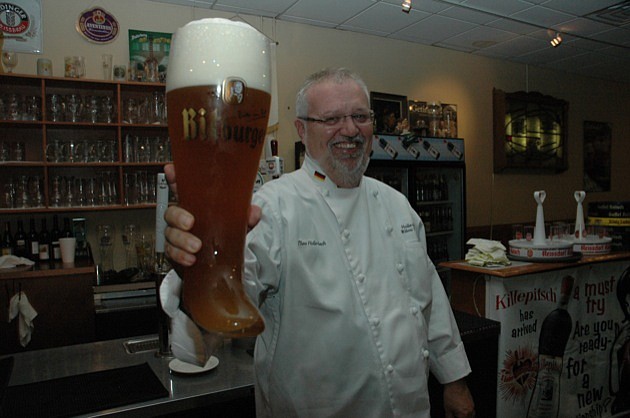- November 26, 2024
-
-
Loading

Loading

Theo Hollerbach will quickly tell you he's not in the food business. Sure, his Willow Tree Cafe serves hundreds of pounds of sausage, schnitzel and German potato salad each week.
But the food is just part of package.
“What I'm really selling is 'gemuetlichkeit,'” says Hollerbach.
Gemuetlichkeit is a German word that describes a sense of well-being and happiness that comes when one shares a good meal with family and friends. Willow Tree's customers have a great sense of well-being, evidenced by Hollerbach's bottom line.
In 2010, Willow Tree's gross revenues were $3.2 million, more than 10 times the restaurant's revenues in 2002, Hollerbach's first full year in business.
Hollerbach notes that the restaurant business is notoriously tough with eateries opening and closing every week. When he and his wife, Linda, opened the business in 2001, they knew their German menu would set them apart.
However, it takes more than a good schnitzel to make a successful business.
“People eat out for two basic reasons: They want to save time and effort, or they want to celebrate,” says Hollerbach.
The couple focused on creating a restaurant in which people could celebrate, whether it be a job promotion or just an opportunity to see old friends.
To accomplish that goal, Hollerbach stressed customer service. If an entree was cold or service was slow, it was corrected — usually by Hollerbach himself. He constantly strolls through the dining area talking with each table. He's easy to identify in his garishly colorful chef's pants and a white chef's jacket.
“I call it my Colonel Saunders outfit. There's no mistaking who I am,” he laughs.
In addition to customer service, Hollerbach is quick to encourage his guests' boisterous behavior by leading a table in a German cheer or convincing a group of senior citizens to join him doing the “Chicken Dance” as the German band plays.
Then there's “the boot.”
For tables that are a little more energetic, Hollerbach has been known to fill a 2-liter glass boot full of beer and offer it to the table under one condition: The boot can never touch the table. Once the first sip is taken from the boot, it must be passed around until all the beer is gone. Failure to do so means good-natured ridicule from Hollerbach and the restaurant's other 300 guests.
“When people leave my restaurant, I want them to ask: 'When's the next time I can come back, and who can I bring with me?'” Hollerbach says.
Plenty of customers are returning, and they drive an average of 36 minutes to come to the Willow Tree, says Hollerbach, who uses three computers and six monitors to track a range of metrics about the restaurant.
The majority of his customers — 82% — come from outside the downtown Sanford ZIP code where the Willow Tree is located. In fact, Hollerbach says his customers regularly come from about 16 ZIP codes in the Metro Orlando area.
What started as a 50-seat restaurant in 2002 has grown to 300 seats. Hollerbach recently opened a German deli around the corner from the Willow Tree to capitalize on the restaurant's success. He says his growth is based on three points he preaches to his employees.
The first is to exceed expectations. “You can't create a good experience for your guests if you don't meet and exceed their expectations,” says Hollerbach.
Exceeding expectations may mean seating a long-time customer before others who have waited longer or offering a free dessert upon learning a couple is celebrating an anniversary.
The second point Hollerbach stresses is to create a benefit. Whether it's changing a process to save money or time or suggesting a new menu item, the key is to look for ways to improve the entire operation.
The final point Hollerbach emphasizes is to make a profit and not just for Hollerbach's benefit. He wants his employees to always be thinking about how to improve their service in order to earn more money, so he has established bonuses for performance and sales.
“You have to make a profit. If you can create a great experience, have a lot of fun and make money too, then that's even better,” says Hollerbach.